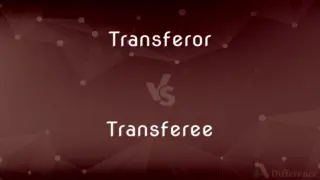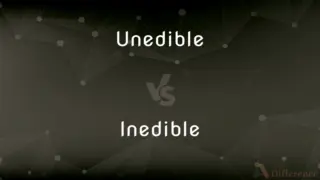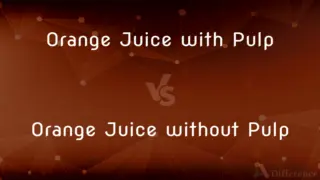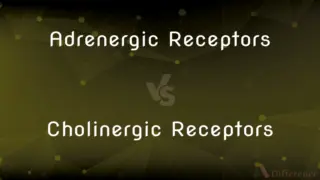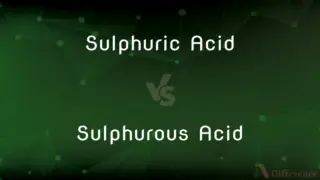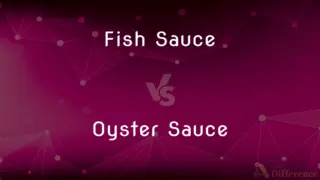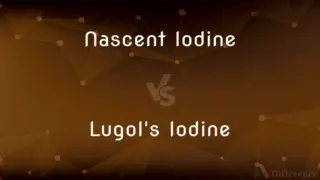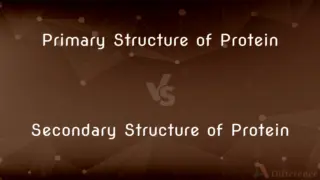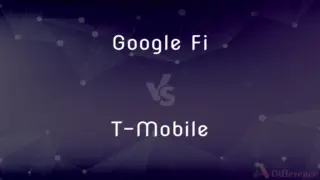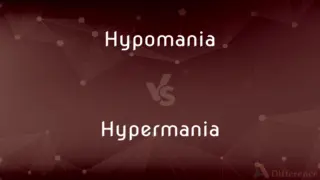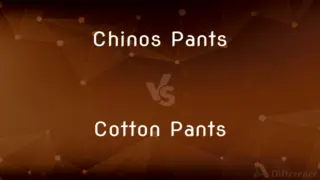Likely vs. Possible — What's the Difference?
Edited by Tayyaba Rehman — By Fiza Rafique — Published on November 5, 2023
"Likely" suggests a higher probability or chance of occurrence, while "possible" simply indicates that something can happen, regardless of how probable. Both words deal with the concept of probability.
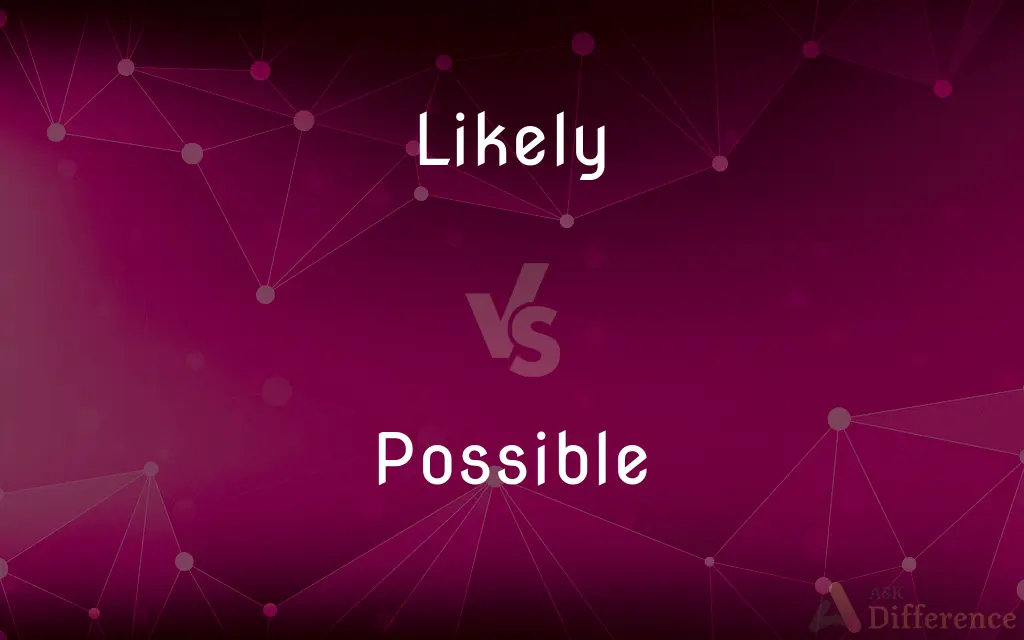
Difference Between Likely and Possible
Table of Contents
ADVERTISEMENT
Key Differences
When we say something is "likely," we are suggesting that there's a significant chance or probability of that event or situation occurring. The word "likely" carries a weight of expectation. On the other hand, "possible" indicates that an event or situation can occur, but it doesn't specify the likelihood or the odds. In essence, "possible" is more neutral in its assertion.
Considering nuances, if someone says it's "likely" to rain, they're suggesting that there's a high probability based on current conditions or predictions. Whereas, if someone says rain is "possible," they're acknowledging the potential for rain but not asserting it's highly probable.
The distinction can influence decisions. For instance, if a picnic is being planned and the forecast says rain is "likely," one might reschedule or plan for indoor activities. If rain is just "possible," one might still go ahead with outdoor plans but be prepared with some backup options.
While both "likely" and "possible" operate in the realm of uncertainties and probabilities, they guide expectations differently. "Likely" leans toward an anticipated outcome, while "possible" remains open-ended.
Comparison Chart
Connotation
Implies a higher probability
Indicates capability without stating probability
ADVERTISEMENT
Usage in a Sentence
Asserts higher chances of an event
Acknowledges an event can occur
Degree of Certainty
More certain
Neutral
Decision Influence
Might prompt action based on expected outcome
Might prompt preparation for various outcomes
Grammatical Role
Often an adjective or adverb
Often an adjective
Compare with Definitions
Likely
Having a high probability of occurring.
Given the dark clouds, it's likely to rain.
Possible
Possiblexisting or available.
We reviewed all the possible options.
Likely
Seems true or probable.
She's likely telling the truth based on the evidence.
Possible
Possibleeing within limits of capability.
Climbing the mountain is possible but challenging.
Likely
Probably going to be or do something.
She's likely going to be the next manager.
Possible
Possibleermissible or allowable.
It's possible to enter the building with permission.
Likely
Apt or inclined to a specified action.
He's likely to forget unless reminded.
Possible
Capable of happening, existing, or being true without contradicting proven facts, laws, or circumstances
Is it possible to move faster than the speed of light?.
Likely
Possessing or displaying the qualities or characteristics that make something probable
They are likely to become angry with him. See Usage Note at liable.
Possible
Capable of becoming or of being made to be so; potential
Possible suspects in the case.
A possible site for the new capital.
Likely
Within the realm of credibility; plausible
Not a very likely excuse.
Possible
Capable of occurring or being done in accordance with something specified. Used with the superlative
You'll get the best possible care at this hospital.
Likely
Apparently appropriate or suitable
There were several likely candidates for the job.
Possible
Capable of happening but of uncertain likelihood
It is possible that you might feel some discomfort after the procedure.
Likely
Apt to achieve success or yield a desired outcome; promising
A likely topic for investigation.
Possible
Permissible
Is it possible to enter the gallery at this hour?.
Likely
Attractive; pleasant
Found a likely spot under a shady tree for the picnic.
Possible
Able but not certain to happen; neither inevitable nor impossible.
Rain tomorrow is possible, but I wouldn't bet on it.
It's not just possible, it's probable that there will be rain tomorrow.
Likely
Probably
They'll likely buy a new car soon.
Possible
(comparable) Capable of being done or achieved; feasible.
It's possible for anyone to learn to pay the bagpipes.
Likely
Probable; having a greater-than-even chance of occurring
Rain is likely later this afternoon.
Possible
Being considered, e.g. for a position.
Jones and Smith are both possible for the opening in sales.
Likely
Reasonably to be expected; apparently destined, probable
They are likely to become angry with him.
He is likely to succeed at anything he tries.
Possible
Apparently valid, likely, plausible.
Likely
Appropriate, suitable; believable; having a good potential
Jones is a likely candidate for management.
Possible
A possible one.
Likely
Plausible; within the realm of credibility
Not a very likely excuse.
Possible
A possible choice, notably someone being considered for a position.
Jones is a possible for the new opening in sales.
Likely
Promising; apt to achieve success or yield a desired outcome
A likely topic for investigation.
Possible
(rare) A particular event that may happen.
Likely
Attractive; pleasant
I found a likely spot under a shady tree for the picnic.
Possible
Capable of existing or occurring, or of being conceived or thought of; able to happen; capable of being done; not contrary to the nature of things; - sometimes used to express extreme improbability; barely able to be, or to come to pass; as, possibly he is honest, as it is possible that Judas meant no wrong.
With God all things are possible.
Likely
(obsolete) Similar; like; alike.
Possible
Something that can be done;
Politics is the art of the possible
Likely
Something or somebody considered likely.
Possible
An applicant who might be suitable
Likely
(obsolete) Similarly.
Possible
Capable of happening or existing;
A breakthrough may be possible next year
Anything is possible
Warned of possible consequences
Likely
Probably.
Likely he’ll win the election in this economy.
Possible
Existing in possibility;
A potential problem
Possible uses of nuclear power
Likely
Worthy of belief; probable; credible; as, a likely story.
It seems likely that he was in hope of being busy and conspicuous.
Possible
Possible to conceive or imagine;
That is one possible answer
Likely
Having probability; having or giving reason to expect; - followed by the infinitive; as, it is likely to rain.
Possible
Possibleapable of happening or being realized.
It's possible that they might visit next week.
Likely
Similar; like; alike.
Possible
Possiblehat can be or can become.
He's a possible candidate for the position.
Likely
Such as suits; good-looking; pleasing; agreeable; handsome.
Likely
Having such qualities as make success probable; well adapted to the place; promising; as, a likely young man; a likely servant.
Likely
Improbable; unlikely; - used ironically; as, a likely story.
Likely
In all probability; probably.
While man was innocent he was likely ignorant of nothing that imported him to know.
Likely
Has a good chance of being the case or of coming about;
These services are likely to be available to us all before long
She is likely to forget
A likely place for a restaurant
The broken limb is likely to fall
Rain is likely
A likely topic for investigation
Likely candidates for the job
Likely
Likely but not certain to be or become true or real;
A likely result
He foresaw a probable loss
Likely
Expected to become or be; in prospect;
Potential clients
Expected income
Likely
Within the realm of credibility;
Not a very likely excuse
A plausible story
Likely
With considerable certainty; without much doubt;
He is probably out of the country
In all likelihood we are headed for war
Likely
To be expected under the circumstances.
Given his experience, he's likely the best candidate.
Common Curiosities
Which word indicates a higher probability: likely or possible?
"Likely" indicates a higher probability than "possible."
Is "possible" more neutral than "likely"?
Yes, "possible" is more neutral, simply suggesting that something can happen.
Is "likely" always used to predict positive outcomes?
No, "likely" just predicts an outcome; it can be positive or negative.
Can both "likely" and "possible" be used interchangeably?
While related, they aren't always interchangeable due to differing degrees of probability.
Can "likely" be used as both an adjective and an adverb?
Yes, "likely" can function as both an adjective ("a likely scenario") and an adverb ("It will likely rain").
Do both "likely" and "possible" deal with future events?
Generally, yes, as both deal with uncertainties and probabilities of future outcomes.
Can "possible" be used to discuss hypothetical scenarios?
Yes, "possible" is often used in discussing what could be or might be.
If something is "likely," is it also "possible"?
Yes, if something is "likely," it is inherently "possible."
Can something be both "likely" and "possible" in a sentence?
Yes, e.g., "It's possible we might go to the park, but it's more likely we'll stay home."
Does "possible" give any indication of probability?
No, "possible" just indicates capability without specifying likelihood.
Do both words originate from Latin?
Both have Latin roots, with "likely" from "lic" (similar) and "possible" from "possibilis" (that can be done).
If something is "unlikely," is it still "possible"?
Yes, even if something is "unlikely," it's still "possible" unless deemed impossible.
Is "possible" often paired with qualifiers?
Yes, you can often hear terms like "very possible" or "barely possible."
Is "likely" more subjective than "possible"?
Often, yes. "Likely" tends to reflect a person's assessment, while "possible" is more objective.
When predicting weather, which term indicates more certainty?
"Likely" suggests more certainty about a weather event than "possible."
Share Your Discovery
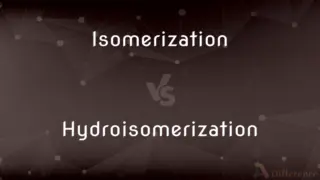
Previous Comparison
Isomerization vs. Hydroisomerization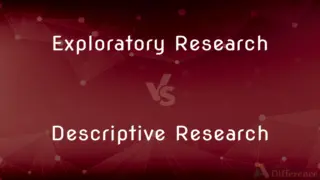
Next Comparison
Exploratory Research vs. Descriptive ResearchAuthor Spotlight
Written by
Fiza RafiqueFiza Rafique is a skilled content writer at AskDifference.com, where she meticulously refines and enhances written pieces. Drawing from her vast editorial expertise, Fiza ensures clarity, accuracy, and precision in every article. Passionate about language, she continually seeks to elevate the quality of content for readers worldwide.
Edited by
Tayyaba RehmanTayyaba Rehman is a distinguished writer, currently serving as a primary contributor to askdifference.com. As a researcher in semantics and etymology, Tayyaba's passion for the complexity of languages and their distinctions has found a perfect home on the platform. Tayyaba delves into the intricacies of language, distinguishing between commonly confused words and phrases, thereby providing clarity for readers worldwide.


